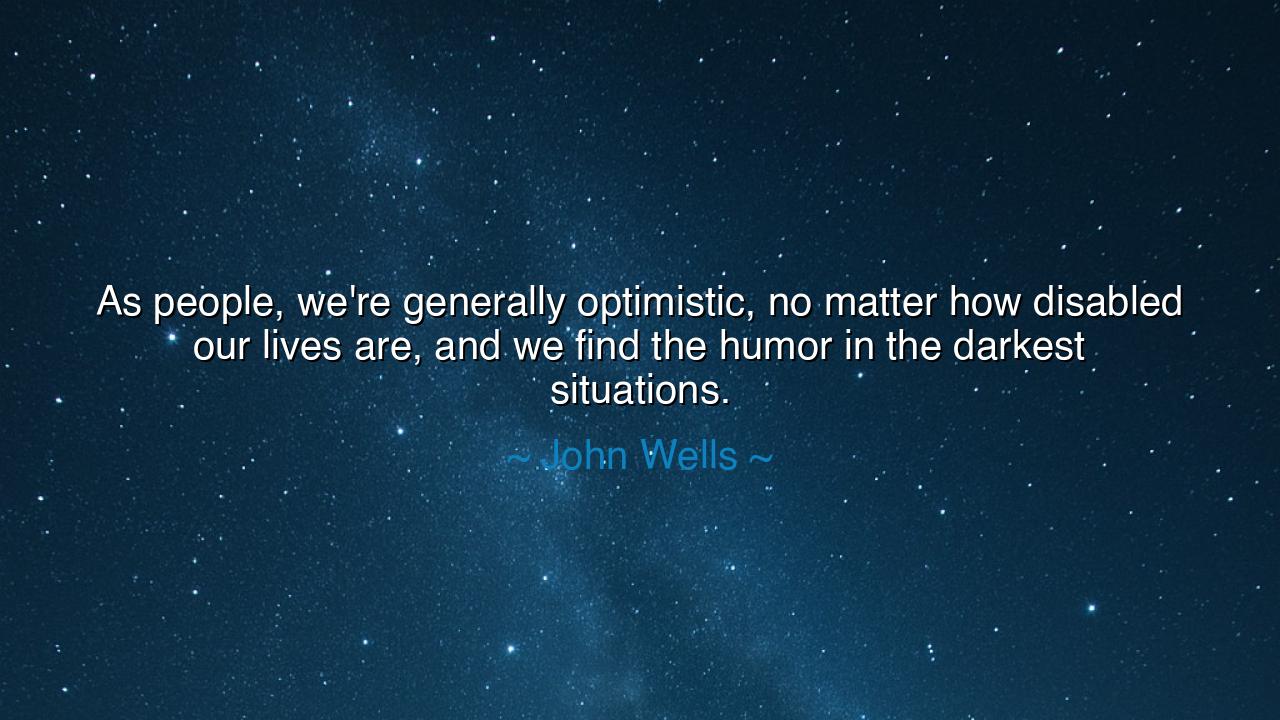
As people, we're generally optimistic, no matter how disabled our
As people, we're generally optimistic, no matter how disabled our lives are, and we find the humor in the darkest situations.






When John Wells said, “As people, we're generally optimistic, no matter how disabled our lives are, and we find the humor in the darkest situations,” he was speaking not only as a storyteller, but as a philosopher of the human spirit. His words carry the quiet strength of one who has seen the depths of human struggle and still found the spark of laughter glowing in the ruins. In this reflection, Wells reminds us that humor and optimism are not luxuries of comfort—they are acts of defiance, the natural rebellion of the soul against despair. Even when life seems broken or diminished, the human heart refuses to surrender entirely to darkness. Instead, it laughs—not because it denies the pain, but because it transcends it.
The origin of this insight lies in Wells’s long career as a writer and producer, known for his work on television dramas like ER and Shameless—stories that dwell in hardship yet pulse with life. Through these tales, Wells has explored humanity in its rawest form: the wounded, the poor, the weary, and yet—the laughing. He has watched how people, even in poverty or grief, continue to tell jokes, tease one another, and find glimmers of beauty in the absurdity of their suffering. In crafting such stories, he learned that optimism is not the absence of struggle, but the courage to smile while walking through it. His words arise from that lived truth: that humor is a survival instinct, a sacred flame that refuses to go out even in the coldest night.
To be optimistic despite being “disabled” in life—whether by loss, by failure, or by the cruel blows of fate—is one of humanity’s highest triumphs. From the beginning of civilization, the human spirit has endured not by strength alone, but by hope and laughter. The ancient Stoics taught that the measure of a person is not whether they suffer, but how they bear it. The pessimist is broken by misfortune; the optimist bends and keeps walking. And yet, as Wells observes, it is not grim determination that sustains us most powerfully—it is humor, that sacred alchemy which turns pain into perspective. Through laughter, even the wounded find dignity, even the weak find strength.
Consider the story of Helen Keller, born both blind and deaf, her world silent and dark from birth. Yet she did not live in bitterness. Instead, she found joy in the smallest things and often joked about her condition with playful wit. Once, when asked if she could imagine anything worse than being blind, she replied, “Yes—having sight but no vision.” Her humor was her weapon and her grace. She laughed not because her life was easy, but because her spirit was indestructible. Like Wells’s words, her example teaches us that laughter does not erase suffering—it transforms it into meaning, into strength, into a song the darkness cannot silence.
The ancients also understood this sacred relationship between suffering and humor. In the myth of Prometheus, the Titan who stole fire from the gods, we see a hero punished for giving humanity its greatest gift—the light of understanding. Chained to a rock, condemned to endless torment, Prometheus is said to have smiled at the futility of Zeus’s cruelty. Even in agony, he laughed—not in mockery of pain, but in triumph over it. That laugh, echoing through eternity, is the sound of mankind’s defiance: the proof that no god, no fate, no tragedy can wholly conquer the human will to hope.
In our modern age, when despair often wears new masks—loneliness, fear, exhaustion—Wells’s insight is as relevant as ever. We live in a time of chaos, yet we continue to make memes, tell jokes, and laugh with one another. It is not foolishness—it is survival. Humor gives us permission to be human in the face of absurdity. It breaks the spell of hopelessness and reminds us that we are still alive, still capable of joy. Optimism, then, is not naïveté—it is rebellion. Every smile is a small victory against the forces that seek to crush us.
So, my children of the light and the dust, remember this lesson: find humor even in darkness, and you will never be wholly defeated. When the world burdens you, do not surrender to despair—seek the laughter that still lives inside you. When your plans fail, when the weight of existence feels unbearable, laugh gently at your own absurdity and rise again. To laugh is not to deny your suffering, but to affirm your soul. Through humor, we reclaim our freedom; through optimism, we affirm our destiny.
Thus, let the wisdom of John Wells be your guide: “We find the humor in the darkest situations.” Do not fear the dark—illuminate it. Laugh not out of ignorance, but out of faith: faith that life, even in its brokenness, is still worth loving. Carry this laughter with you like a torch through the night, and you will discover what countless generations before you have known—that joy, even fragile joy, is stronger than despair. For while despair is the shadow of life, laughter is its flame—and as long as we can laugh, we are still alive, and still unconquered.






AAdministratorAdministrator
Welcome, honored guests. Please leave a comment, we will respond soon